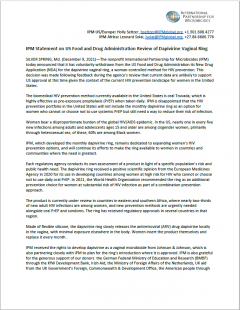IPM Statement on US Food and Drug Administration Review of Dapivirine Vaginal Ring
SILVER SPRING, Md. (December 9, 2021)—The nonprofit International Partnership for Microbicides (IPM) today announced that it has voluntarily withdrawn from the US Food and Drug Administration its New Drug Application (NDA) for the dapivirine vaginal ring, a woman-controlled method for HIV prevention. This decision was made following feedback during the agency’s review that current data are unlikely to support US approval at this time given the context of the current HIV prevention landscape for women in the United States.
The biomedical HIV prevention method currently available in the United States is oral Truvada, which is highly effective as pre-exposure prophylaxis (PrEP) when taken daily. IPM is disappointed that the HIV prevention portfolio in the United States will not include the monthly dapivirine ring as an option for women who cannot or choose not to use systemic PrEP but still need a way to reduce their risk of infection.
Women bear a disproportionate burden of the global HIV/AIDS epidemic. In the US, nearly one in every five new infections among adults and adolescents ages 15 and older are among cisgender women, primarily through heterosexual sex; of these, 60% are among Black women.
IPM, which developed the monthly dapivirine ring, remains dedicated to expanding women’s HIV prevention options, and will continue its efforts to make the ring available to women in countries and communities where the need is greatest.
Each regulatory agency conducts its own assessment of a product in light of a specific population’s risk and public health need. The dapivirine ring received a positive scientific opinion from the European Medicines Agency in 2020 for its use in developing countries among women at high risk for HIV who cannot or choose not to use daily oral PrEP. In 2021, the World Health Organization recommended the ring as an additional prevention choice for women at substantial risk of HIV infection as part of a combination prevention approach.
The product is currently under review in countries in eastern and southern Africa, where nearly two-thirds of new adult HIV infections are among women, and new prevention methods are urgently needed alongside oral PrEP and condoms. The ring has received regulatory approvals in several countries in that region.
Made of flexible silicone, the dapivirine ring slowly releases the antiretroviral (ARV) drug dapivirine locally in the vagina, with minimal exposure elsewhere in the body. Women insert the product themselves and replace it every month.
IPM received the rights to develop dapivirine as a vaginal microbicide from Johnson & Johnson, which is also partnering closely with IPM to plan for the ring’s introduction where it is approved. IPM is also grateful for the generous support of our donors: the German Federal Ministry of Education and Research (BMBF) through the KfW Development Bank, Irish Aid, the Ministry of Foreign Affairs of the Netherlands, UK aid from the UK Government’s Foreign, Commonwealth & Development Office, the American people through the US President’s Emergency Plan for AIDS Relief (PEPFAR) in partnership with the United States Agency for International Development (USAID), and the Bill & Melinda Gates Foundation.
Related statements:
- World Health Organization: WHO continues to support its conditional recommendation for the dapivirine vaginal ring as an additional prevention options for women at substantial risk of HIV
About IPM: IPM is a nonprofit organization dedicated to developing new HIV prevention tools like the monthly dapivirine ring and other sexual and reproductive health technologies for women, and making them available in developing countries and other low-resource settings where the need is urgent. IPM has offices in the United States, South Africa and Belgium. Please visit www.IPMglobal.org.
About dapivirine: Dapivirine is a non-nucleoside reverse transcriptase inhibitor that blocks HIV’s ability to replicate itself inside a healthy cell. IPM holds an exclusive worldwide license for dapivirine from Janssen Sciences Ireland Unlimited Company, one of the Janssen Pharmaceutical Companies of Johnson & Johnson. The license is designed to ensure that women in low-resource settings have affordable access to any dapivirine-based vaginal HIV prevention method.
